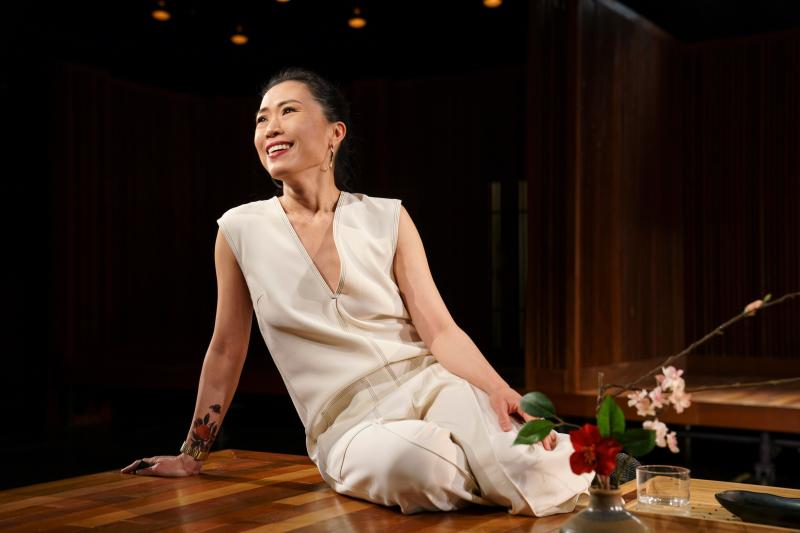Review: Halley Feiffer Finds Symbolism In Her Real-Life Ailment With THE PAIN OF MY BELLIGERENCE
If you're like this male theatre critic, you'll spend the first twenty minutes or so of Halley Feiffer's The Pain of My Belligerence wondering why the woman at the center of the story is putting up with the atrocious immature behavior of the guy who's her arrogant and disrespectful dinner date. If you're like the woman who was my theatre companion for the evening, you'll know exactly what's going on.

(Photo: Joan Marcus)
Feiffer, who also plays the leading role, helps explain her intentions in an essay contained in the program, which is handed out as the audience exits the 75-minute performance. (Click here to read it in its entirety.) In it, the playwright reveals how her recent success in both her career and in handling alcohol addiction parallels with a time when her body was feeling the effects of Lyme disease.
"Several years into sobriety and a few years into the sickness, I wanted to open my heart to something other than recovery, work, and health," she writes. "I decided to open it back up to men. And soon I was sicker than ever."
And while the play is not autobiographical, it is, we can assume, inspired by discoveries the playwright made about herself - and aspects of herself that she sees in other women - particularly as it may apply to straight people's romantic relationships in a time that saw Donald Trump's rise to power.
There are three scenes, each containing a reference that sets its date as Election Day, 2012, 2016 and 2020, respectively. Instead of checking how Obama is doing against Romney in 2012, 29-year-old free-lance writer Cat (played by Feiffer) is on a first date with Guy, a restauranteur in his early 40s. Cat's career received a big boost with a well-received "New Yorker" profile of Guy's business partner Suki, who he describes as his "soon-to-be ex-wife."
Guy is played by the impeccably charming Hamish Linklater, and yes, his attractiveness may have something to do with why Cat seems to welcome his behavior with playful giggles rather than getting up and leaving.
"You're very beautiful," he says to his date, in a manner that may seem like a calculated seduction move to viewers, but makes Cat look downward with delighted embarrassment.
It isn't long before he's criticizing her for self-conscious behavior and even, at one point, calling her racist, but any time Cat seems apt to stand up for herself, Guy injects an innocent, "just kidding" or "joking" to close the subject. When he compliments her for being "feisty," it's with an amused, patronizing tone.
Though Cat often appears thrown by Guy's verbal and physical aggressiveness, she counters by either mimicking his behavior or admonishing him with flirtatious smiles. At one point it appears a bluntly sexual comment of his may have crossed over the line, but given the way Cat had been previously reacting, it's difficult to tell where the line has been drawn. Guy occasionally puts his face so close to hers that it looks like he's about to kiss her, but instead he patiently waits for her to be the one who breaks the barrier.
To Guy, and some in the audience, it may seem like she likes it. To others, it may seem like it's what she's willing to settle for. The question of what she is seeking intensifies in the play's second scene, where, four years into her affair with the still-married Guy, Cat initially turns down his advances before instigating furious sex with him moments after news reports make it apparent that Trump is about to be elected president.

As foreshadowed in the first scene, Cat has grown chronically ill by 2016, though her ailment isn't specified just yet.
"Maybe this isn't what you want to hear right now, but you look really f-ing sexy when you're sick," is Guy's assessment.
By the third scene, Suki (cool and poised Vanessa Kai, excellent) has entered into the picture, as Cat interviews her for a follow-up article. The differences between the two women suggest each one's ability to immunize herself from a societal sickness that, perhaps, Cat's physical sickness is meant to represent. Certainly, the play's logo, a woman embracing a tick, leads to that conclusion.
Whether or not Feiffer's play successfully addresses her stated intention may be a judgment call, but if the text could use a bit more focus in that direction, the playwright's sharp, intelligent dialogue always engages and intrigues.
And the thick chemistry between Feiffer and Linklater in director Tripp Cullman's light and swift production allows the bulk of the piece to play like romantic comedy, providing an interesting contrast between tone and content.


